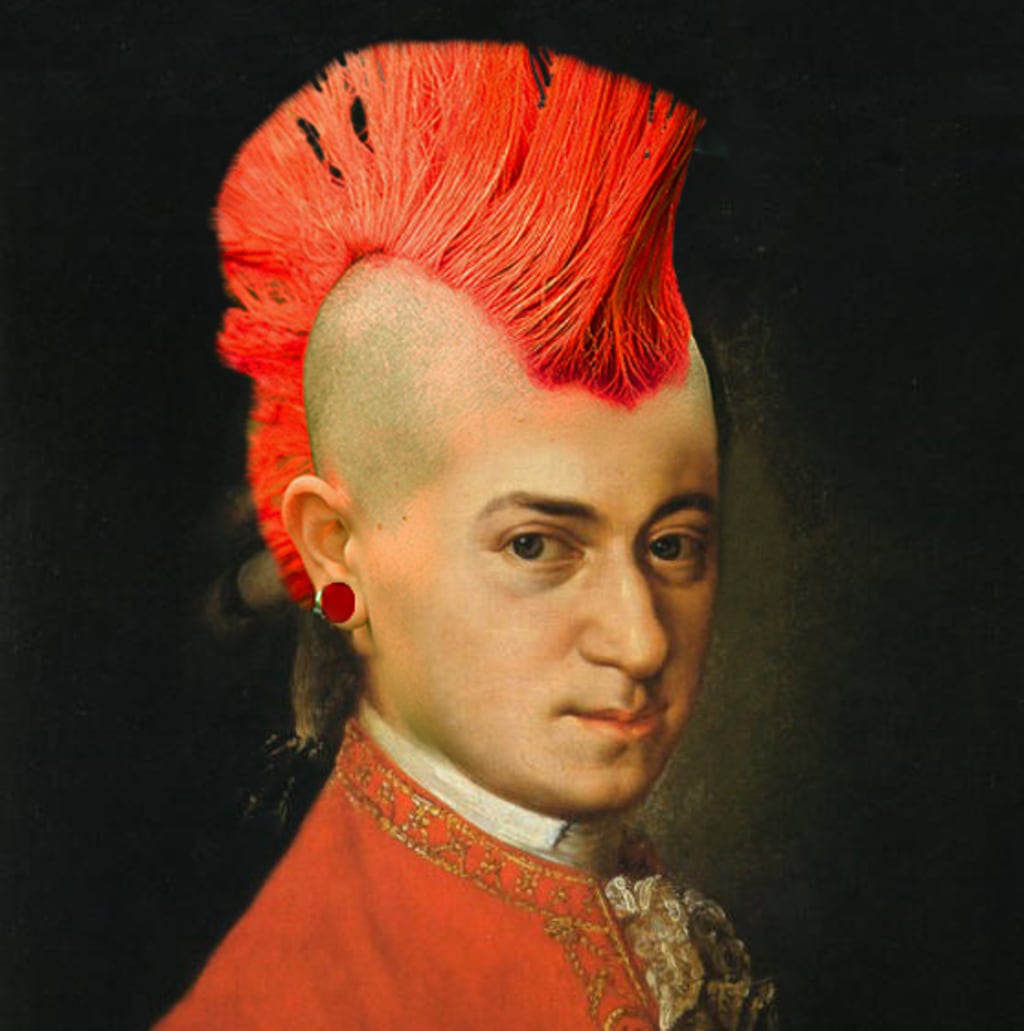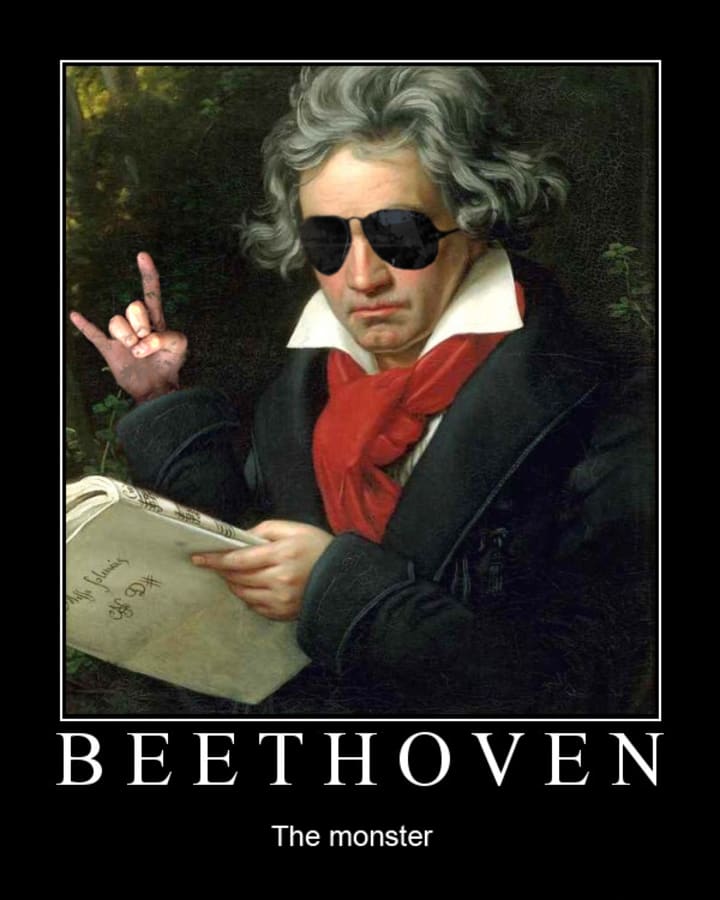4 Rockstar Classical Composers
Think bad-boy musicians are a modern phenomenon? Nope

Classical music is dull as dishwater, isn’t it? The stuffy, well educated middle-aged, reverentially filling concert halls, following etiquette as mysterious as it is non inclusive. If you infiltrate this world, you will hear talk of modal fifths, the importance of madrigals, and secret whispers that the flautist was a beat early at the beginning of the recitative. The truth is that, even for those who enjoy Classical music, there is layer upon layer of snobbery and study that can often make the world seem entirely inaccessible.
If you are of an enquiring mind, this thought may have crossed your mind:
‘Where are the Hendrix’s, Joplin’s and Winehouse’s, the tortured souls whose genius and downfall litter the world of popular music?’
They are there. But they tend to be lost in academic rigour and a focus on the music rather than the person. Sometimes, though, the person and their journey are vital for an understanding of how we get to where we are now. Remember that, as you read this, each person I mention was often composing the most radical and influential music of their day. They were, believe it or not, pop stars.

Bach - Backstreet Brawler
Johann Sebastian Bach was, by any stretch of the imagination, quite the rock-n-roll character. If you hear his name, you may rightly think choral and church music. Musicians in the 1600’s were typically employed by churches who aimed to outdo each other in their scale and quality of productions at Christmas and Easter. Think of them as rival music festival promoters. The quality of their ‘act’ would be essential in attracting the richest benefactors and ensuring the clergy attached to the church could live in luxury. Just as God wanted.
At the age of 20, Bach was employed at Arnstad as musical director. This included overseeing an ensemble of student musicians, many older than this pipsqueak from the right side of the Ohrdruf tracks. As is usually the case, believe it or not, these musicians were actually quite a band of rogues, hard-bitten and hard-drinking, and Bach struggled to control them.
One day, while walking with his cousin, Bach happened upon a group of his students lurking on a street corner. Swiftly he was surrounded, and his bassoonist, a man named Geyersbach, approached Bach with a plank of wood. Geyersbach had been hunting Bach, incandescent with rage that Bach had called him a ‘nanny-goat bassoonist’ in front of his peers. As he approached him to have it out, Bach pulled a knife on Geyersbach and, despite being considerably outnumbered, managed to fight his way out of this confrontation and fled.
He left Arnstadt soon after. You may be interested to know - you may know in fact - that eventually he ended up in Leipzig. Bach - THE Bach - comes to apply for a job at your church, it’s just a shoe-in right? Wrong. Bach had to fight his own reputation as a troublemaker, and was only accepted as THIRD choice at the place where he composed work tat astounds is to this day.
Bach sired twenty children by two wives, eight of whom outlived him, four of whom would become significant musicians in their own right. Move over Billy Ray Cyrus; this musical lineage lasted for around 200 years.
Mozart - Money Money Money!
You may think you know Mozart: a child prodigy, who died a pauper, unappreciated in his time. This is the fairly well worn tale, but it is not entirely accurate. Mozart was very much the KISS of his day (from a marketing perspective; musically, the hype is very much deserved).
His beginnings were far more Jackson 5 than KISS as he performed from a ridiculously early age, wowing important people across Austria and Germany, alongside his sister and at the hand of his domineering father. At this time patronage was moving from church-based to royal, and so young Mozart received gifts and trinkets in lieu of payment from aristocrats. As he aged, and married a like-minded woman, the trinkets didn’t quite cut it, and so Mozart dramatically increased his marketability and therefore his earnings by doing one thing: writing operas in German!
This was shocking stuff at the time as operas were supposed to be serious affairs about life, death, and sex, sung in serious Italian by a cast of thousands. This made them expensive to produce, and even more expensive to attend. Some composers did write opera for the masses, but none with Mozart’s reputation or talent.
Mozart walked the tightrope between the people and the aristocracy, writing bawdy people pleasers like Die Zauberflote with tunes that you could hum, and spectacles such as Don Giovanni for the rich. He pioneered the business of pop music, appealing to a breadth of tastes and classes, and made money hand over fist. Unfortunately, he also spent money like a sailor on leave, and so died relatively poor.
In the grand tradition of any marketable pop star though, his wife was able to live comfortably off earnings from his work following his death. Mozart: KISS, Elvis, Tupac, The Beatles, Marvin Gaye, Kanye, all rolled in to one.

Beethoven: Syphilitic Egg Chucker
Beethoven was rock and roll. Keith Richards, Jimi Hendrix, and Sid Vicious would’ve struggled with his excess. I can imagine them holding him back as he launches himself at Chris Martin when they all meet in the afterlife: ‘C’mon Ludwig, don’t you think that’s a bit much?’
His genius is, arguably, unparalleled. Crossing three different musical periods, supported by long-suffering patrons throughout his life, Beethoven was one of the first to compose music entirely for his own pleasure. This led to many musical advances, including composing music for instruments that didn’t even exist yet.
In Beethoven’s defence, if he was syphilitic it probably was from birth rather than as a result of a life well lived. His well known deafness and descent into extremes could also be explained by his definite alcoholism and penchant for cheap wine which, at the time, was laced with lead to make it sweeter.
Beethoven led an angry life. He had a fairly traumatic childhood, as his father pushed the genius in increasingly harsh ways. He idolised Napoleon as a heroic revolutionary leader, then had that devotion cruelly shattered after Napoleon declared himself Emperor of Europe. Coupled with his rapidly deteriorating health and increasing deafness, this almost destroyed Beethoven, and he retreated to his rooms, shunning most public performance to his death.
When I imagine Beethoven, I take a lot of inspiration from the Beethoven in Bill and Ted’s Excellent Adventure. A tortured genius, but one who desperately wanted to do right by his world and the life of others.
Oh, and the egg throwing? He would throw them at his housekeeper for fun. She probably didn’t think quite so highly of him.

Stravinsky the Instigator
Before we all became scared of teenagers and their rock ‘n’ roll, before Brighton echoed to the sound of bike chain on flick knife during the pitched battles between Mods and Rockers, the place to find real cultural tension was in the audience of Paris's Théâtre des Champs-Élysées on the night of May 29th 1913.
Igor Stravinsky, a young up-and-coming Russian composer, had been tasked with writing three avant-garde ballets for the theatre. His first two - Firebird and Petrushka - were received warmly by all factions. The tradition of the ballet was respected for the conservative traditionalists, while the bohemians of the audience lapped up the experimental discordance and rhythms Stravinsky was becoming known for. However this delicate balance collapsed for his third ballet: The Rite of Spring.
To lay all the blame at Stravinsky’s door is perhaps unfair (or it’s unfair to not give the choreographer Vaslav Nijinsky credit), but the story goes that he set out to deliberately shock an audience to raise his profile. The music, discordant and syncopated, was matched by lurching, stomping ballerinas committing the cardinal sin of pointing their toes inwards as they danced.
This was a step (hoho) too far and the traditionalists began hurling things at the orchestra. The bohemian enclave had, conversely, never seen anything more excited, and rose up to defend the performers and the performance. It was Trumpists vs Antifa. Fixtures were torn up, punches thrown, and eventually around 40 people were arrested. It is safe to say that Stravinsky’s reputation was well and truly made, and the Rite of Spring was a raging success.
What makes me lean towards this being a deliberate piece of provocation is the sister tale to this, taking place around 40 years later as Stravinsky toured America. He gave his very own take on the Star Spangled Banner. Now, viewed through the torture we have seen this national anthem receive by many amateur, and far too many professional, singers, it’s not that bad. But at the time it caused ructions, and - perhaps older and wiser - Stravinsky pulled his version eventually.
The enjoyable thing about composers such as Stravinsky is that they lived ina time when we were able to actually hear their work as it was. So, I end, ladies and gentlemen, stood, hand on heart, as we salute the flag:
To sum up, music is music is music. Just because you may think of something as stolid or pedestrian or boring doesn’t mean (much like your grandparents) it always was. Music is designed to excite our passions and inflame arousal, and often that is released in many different ways. Most importantly is that the artists that create the culture we hold dearly are without exception flawed, wonderful human beings, far closer to you and I than on the pedestal which they now sit.
If you enjoyed this and would like to show appreciation, please click on the heart. If you would like to feed my Mozartian habits of excess, a tip would be most appreciated. It’ll keep me in harpsichords and doublets.
About the Creator
Dominic McGowan
I’m very much motivated by a wish to escape from reality. Weirdly that more often than not involves dark, dystopian fantasy or science fiction, which you’d think, given the state of the world, would be the last place I want to retreat to.







Comments
There are no comments for this story
Be the first to respond and start the conversation.